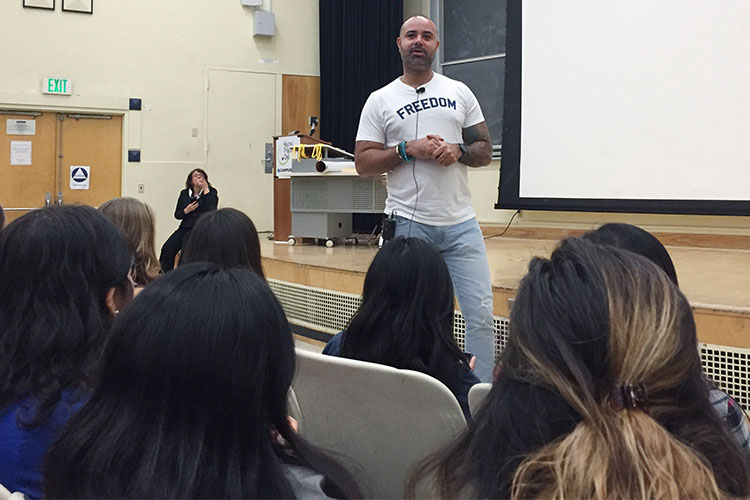Campus reinforces zero tolerance for hazing with screening of Goat
Post-screening discussion brought controversial practice out into the open as part of Hazing Prevention Week on campus

September 27, 2016
Hazing. It’s a dirty secret often left unspoken. But it was front and center when nearly 500 students gathered recently for a very open discussion of the controversial initiation ritual following a special screening of the film Goat, starring Nick Jonas and James Franco.
Berkeley was one of five campuses in the nation to host the free premier of the gritty story based on the memoir of Brad Land, played by Ben Schnetzer, who follows his older brother to college in South Carolina and pledges the same fraternity while still coping with a traumatic assault that has left him physically and emotionally scarred. In the course of pledging the fraternity, intense hazing further tests Brad’s limits and strains his relationship with his brother.

Leading Berkeley students in a discussion of hazing was Eddie Banks-Crossan of CAMPUSPEAK, who is director for Fraternity & Sorority Life at the University of Pennsylvania. (UC Berkeley photo by Se Yeon Kim)
“Hazing is rooted in the idea that they have to break people down to be able to build them back up to an ideal of masculinity, femininity, or even an ideal of humanity,” said Dylan C. Howser, coordinator of UC Berkeley’s LEAD Center (Leadership, Engagement, Advising and Development). “These organizations should instead be bringing in people who are already living their values, so they don’t have to break anyone down, they just have to empower them.”
After the screening, CAMPUSPEAK led a discussion workshop for students with a professional expert on hazing, and HazingPrevention.org was there to support the campus community and raise awareness as part of Berkeley’s third annual Hazing Prevention Week.
The week highlights an important chance to educate students early on about hazing. While hazing is most often thought to be a part of sports teams and fraternity and sorority life, it can also occur in many other areas of the student experience. The week is a time to challenge that notion and share resources and support.
According to StopHazing.org, 47 percent of students are hazed before they enter college. “At the high school level, it’s happening in student clubs, in student government and in athletics. When these students get to college, it can lead to a misconceived expectation that hazing should be happening here too,” said Howser. “Hazing is a multifaceted issue, and anything we can do to move the dial forward to no hazing on this campus is important.”
Students are critical to leading the charge to zero hazing on campus as they help raise awareness with each other and create positive experiences within their activities and organizations. For instance, senior cognitive science major and Panhellenic Council President Divya Thomas has been working hard to eliminate all practices, including hazing, that make people feel excluded from the Panhellenic community.
“For me, joining the Greek community was my way of finding a family and a home here. Thinking of an organization where we call ourselves sisters or brothers, it makes me sick to think people would be willing to hurt each other to call each other family,” Thomas said. “That’s not what family should mean.”
Thomas hopes that events like the screening of Goat will help students understand they can come forward, that there’s a safe and confidential space if they need help, and that there are leaders and advisers on campus who care about them.
“Hazing is not always about forcing people to drink alcohol or do dangerous things. Hazing encompasses anything that someone forces you to do that makes you feel uncomfortable. If you feel uncomfortable, you need to speak out,” she said. “You are not alone. People are here to support you.”
Senior Jack Austin, a legal studies major, football team wide receiver and Golden Bear Advisory Committee (GBAC) president, shared those sentiments. “Through GBAC, we’ve done a lot of outreach around hazing prevention and letting people know the dangers of hazing,” he said. “We do tabling on Sproul Plaza to talk with students, hand out fliers, and share statistics. People need to hear about the reality of hazing and face it.”
Throughout the years, the Berkeley campus has made it clear that there is no tolerance for hazing. Raising awareness about the issue and ensuring students are equipped with proper support and resources for dealing with any situation that causes them emotional, physical, or psychological distress is critical.
Showing a film like Goat on campus followed by the frank discussion makes a strong statement. “Students shouldn’t feel like hazing is a norm,” Austin said. “No one should feel like they have to go through hazing to be a part of something, to be accepted in a group.”
Additional support and resources
- Anyone with any information about allegations or incidents of hazing should contact the Center for Student Conduct at (510) 643-9069 or [email protected].
- More information about resources regarding sexual violence or sexual assault is available at the PATH to Care Center: care.berkeley.edu
- University Health Services (UHS) Social Services (Tang Center) provides confidential individual counseling, group counseling and consultation. No fees for survivors. For after-hours emergency consultation with a counselor or crisis resource referrals, students may call (855) 817-5667.
- If you or someone you know needs support for a hazing issue, call the 24-hr hotline 1-800-NOT-HAZE. (1-800-668-4293)